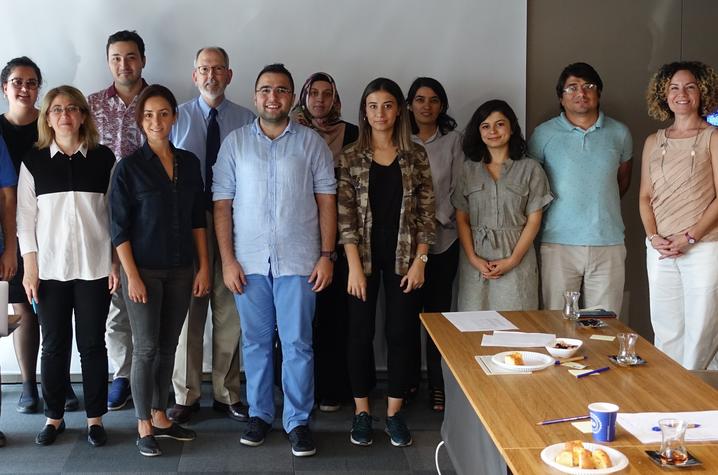UK Graduate School’s Preparing Future Faculty Program Shares Expertise Home and Abroad

LEXINGTON, Ky. (Oct. 18, 2019) — The University of Kentucky Graduate School’s Preparing Future Faculty (PFF) program has been cultivating future generations of college and university teachers for years, and now it has taken its expertise abroad at the request of two universities in Turkey.
The Preparing Future Faculty curriculum, now in its 25th year, provides graduate students across disciplines with guidance in exploring and preparing for a faculty career. PFF initiatives include coursework, workshops, shadowing, and practica and is made possible through collaborations with the College of Education’s Department of Educational Policy Studies and Evaluation, the Center for the Enhancement of Learning and Teaching and other units across campus.
“Graduates of our PFF and Graduate Certificate in College Teaching and Learning curriculum have significant advantages in landing faculty positions and starting their faculty careers with confidence and momentum,” said Morris Grubbs, assistant dean of the UK Graduate School and director of Graduate Student Professional Enhancement. He also teaches one of the core courses in the PFF program.
Among the goals of the program are to assist graduate students and postdoctoral trainees in learning in-depth about faculty roles and responsibilities at a variety of types of institutions of higher education and in acquiring the skills in active teaching and reflective practice needed to succeed in faculty positions.
UK is sharing the curriculum of this successful program with two research universities in Turkey, Sabanci University in Istanbul and Abdullah Gul University in Kayseri. They hosted Grubbs from Sept. 3-12 to speak with faculty, students and administrators on the rewards and challenges of a PFF program.
This is the first invitation extended to UK to assist in implementing a PFF program abroad.
“The PFF program helps build the knowledge and skills Ph.D. students need to excel in teaching and service, as well as to nurture a fruitful marriage of research and teaching," Grubbs said. "It’s exciting to see institutions abroad embrace PFF and build their own versions designed specifically around their distinct higher education systems.”
Upon completion of the grant project in Turkey, titled “Adaptation of a Preparing Future Faculty Program for the Turkish University Context,” approximately 430 graduate students across the two universities are expected to benefit from the program.
The grant project is funded by the U.S. Embassy in Ankara, Turkey. Grubbs’ visit marked the initial phase of the project that runs through August 2020.
Grubbs has served as the administrative director of PFF and the Graduate Certificate in College Teaching and Learning since 2007. Jeffery Bieber, professor of educational policy studies and evaluation, serves as the faculty director. Linda Worley, professor of German in the Department of Modern and Classical Languages, Literatures and Cultures, is faculty director emerita and a UK PFF co-founder.
In response to shifts in the job market for graduates with doctoral degrees, PFF at UK has expanded to include a Preparing Future Professionals track for graduate students and postdoctoral trainees to explore and prepare for careers outside of academia.
UK was one of the original 17 research universities in the U.S. in the mid 1990s to receive grant funding from the Council of Graduate Schools, The Pew Charitable Trusts, National Science Foundation and other sources to begin PFF initiatives. More information about UK’s PFF/P program can be found here.
As the state’s flagship, land-grant institution, the University of Kentucky exists to advance the Commonwealth. We do that by preparing the next generation of leaders — placing students at the heart of everything we do — and transforming the lives of Kentuckians through education, research and creative work, service and health care. We pride ourselves on being a catalyst for breakthroughs and a force for healing, a place where ingenuity unfolds. It's all made possible by our people — visionaries, disruptors and pioneers — who make up 200 academic programs, a $476.5 million research and development enterprise and a world-class medical center, all on one campus.




